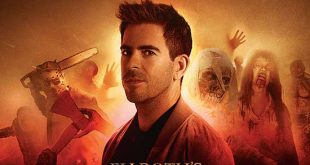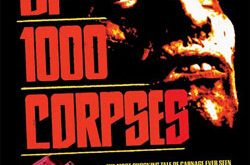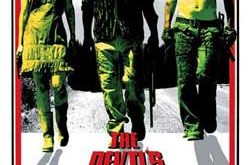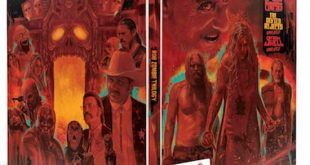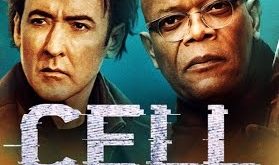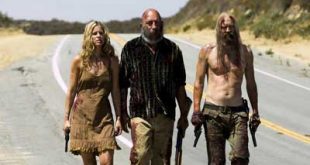Last year, in case you were hiding in a hole and weren’t aware, Rob Zombie’s Halloween II came out. A flood of reviews submerged the information super highway as critics rushed to have their say. I held off on watching the film for a number of reasons. First and foremost, I was feeling slightly pressured by all the internet advertisements to go watch the movie, so I said, “No! Fuck you Internet!
I will not be peer-pressured into watching Rob Zombie’s latest creation!” Second, there were too many voices, too much of a cacophony of people loving or hating the film – not only on horror sites, but also on social networking sites. Coincidentally, I read more on the social networking sites than I did on the horror sites, sort of like when Titanic came out and there was almost no way in hell you could avoid Celine Dione’s song no matter how hard you tried. Then, out here on the east coast, the NYC-based radio station Z100 came out with a remix of Celine’s song interweaved with parts from the movie and now I had the opportunity to hear Leo drown even though I hadn’t yet actually seen Leo drown…and for f*ck’s sake, how many times do I need a commercial and a remixed song yelling at me, “I’m the king of the world!”
No sh*t, your movie just made $1.6 billion, do you need to rub our noses in it? It’s like Cameron was taking a cue from Dave Chappelle before The Chappelle Show even existed and was screaming over the airwaves, “I’m RICH, bitch!”
But, as usual, I digress…
Halloween II. Now that the film is out on DVD, we have the opportunity to discuss it one more time before laying it to rest once and for all. However, before I barrel headlong into a discussion of the film, let me lay my cards out on the table. I have never been a Rob Zombie or White Zombie “fan.” Fact is, I’ve barely ever listened to his or his band’s music. Growing up, if one of his videos popped up on MTV, I normally flipped the station. I was a grunge-punk-metal kinda guy. Nirvana, Pearl Jam, Soundgarden, Sonic Youth, Ramones, Sex Pistols, Dead Kennedys, Metallica, Marilyn Manson, Queen…yes…Queen. (Tie Your Mother Down, bitches.) And I was from Jersey, so it would have been illegal for me not to know every Bruce, Bon Jovi, Billy Joel, or Sinatra album ever released. So there was little room for Rob Zombie or White Zombie in my CD, WinAmp, and iTunes collection. However, when I saw Rob Zombie playing with Slash, Scott Ian, Tommy Lee, Gilby Clarke, and Ace Frehley for VH-1 Rock Honors as they covered God of Thunder, I was impressed. (Especially since I had just seen Ace play onstage with Pearl Jam in Atlantic City).
I also don’t know Rob Zombie personally. I know people who know him and from all accounts, he’s actually a really nice guy. I’ve read some of his interviews, some of what he says sounds like hype, or at least I hope it’s hype (really, drama ensues on all of your sets and you can’t get along with any of your producers ever, Rob?). Other things he says sounds like a typical neurotic Northeastern suburbanite…a condition I believe is secretly spread in hospital emergency rooms as newborns are intravenously shot full of neurosis at an early age to ensure that we will be a breed of caffeinated “go-getters” driven to crush all competition or doomed to crumple beneath the weight of our internal stress.
That ought to cover my bias about him and his music – I’m largely detached and not crazy one way or the other. So far as his previous films, here’s a rundown of my thoughts:
House of 1000 Corpses – liked it. Yes, I liked it. I know this goes against the grain of most opinions, but it was original. Had some interesting visuals that reminded me of work that came out of art/film schools from the 60s. The acting was what most impressed me. Sheri Moon is f*cking creepy. Bill Moseley, second creepiest. Sid Haig is just brilliant. And the storyline was original enough to go along with. Though I’m not certain it’s ever addressed why this movie needed to be made.
The Devil’s Rejects – liked it more. Same great acting. William Forsythe added a brilliant dimension. Better tension built. More controlled. Again, I’m lost on what the message is. Maybe, “white trash wackos have family values, too”? In which case, Korn already covered this angle.
Halloween – didn’t like it at all. I understand what he was up against, but why take the project then? The film didn’t build on the legacy, didn’t sufficiently explain the psychosis he was hoping to explain (which is what I’m assuming the point of the film was in the first place), and the visuals didn’t carry the same poignancy as his previous work. Carpenter’s film was a landmark. Zombie’s version fell drastically short.
So again, I’m brought to Halloween II. As stated before it’s now out on DVD – meaning you can now add it to your Netflix, Blockbuster, or Red Box queue and not feel guilty for purchasing it if you wind up not enjoying it. Regardless, after watching the theatrical version on DVD, I plodded my way through reviews to see what was said, and oddly enough, it was David Edelstein of New York magazine who, in an article ironically titled, “Garish Priest Rob Zombie’s numbing Halloween II – The Projectionist,” I found to offer one of the more insightful opinions:
![halloween2_myers[1]](https://horrornews.net/wp-content/uploads/2010/10/halloween2_myers1.jpg) “The sick joke of the original was the contrast between the rage against young girls’ sexuality and the clean visual lines and limpid tracking camera and repetitive theme music that climbed the scale and dropped back down — but the chords of which never resolved. (Some critics complained about Michael Myers’s lack of motivation for killing — as if a disturbed little boy or boy-at-heart needs a motive to fantasize about harming nubile babysitters!) But clean lines don’t interest Zombie. He shoots violence close, too close, to disorient you and make you jump. A nihilist headbanger, he’s magnetized by squalor and free-floating sadism. He clearly never wanted to be stuck in tidy Haddonfield—he kept drifting to the outskirts with its seedy strip clubs and rusty pick-ups and slobbering white trash misogynists with tattoos and goatees who are all potential rapist-murderers. His world is a nasty, carny freak show in which families (genuine or surrogate) that stay together, slay together.”
“The sick joke of the original was the contrast between the rage against young girls’ sexuality and the clean visual lines and limpid tracking camera and repetitive theme music that climbed the scale and dropped back down — but the chords of which never resolved. (Some critics complained about Michael Myers’s lack of motivation for killing — as if a disturbed little boy or boy-at-heart needs a motive to fantasize about harming nubile babysitters!) But clean lines don’t interest Zombie. He shoots violence close, too close, to disorient you and make you jump. A nihilist headbanger, he’s magnetized by squalor and free-floating sadism. He clearly never wanted to be stuck in tidy Haddonfield—he kept drifting to the outskirts with its seedy strip clubs and rusty pick-ups and slobbering white trash misogynists with tattoos and goatees who are all potential rapist-murderers. His world is a nasty, carny freak show in which families (genuine or surrogate) that stay together, slay together.”
What Edelstein says doesn’t seem that far off base for me – even though I paused at the “headbanger” slight and wanted to call him up and yell into the receiver, “You reductive, stereotyping f*ck!” However, what I have struggled with since watching this film is what Zombie was trying to “get” at. That is, what’s the message or purpose to this film?
So let’s backtrack before getting into what Zombie’s message is…assuming there is a message to be found somewhere, anywhere, in Halloween II…and break the film into parts that make up the whole. Perhaps doing so might shed some sort of light upon what he was attempting to do…or at the very least, what the end product functionally does.
One thing I must always give Zombie credit for is his casting choices and what he is able to get out of his actors. Very few times in any of his films do I ever find myself rolling my eyes and moaning to myself, “Ugh! Acting!” In fact, it’s quite the opposite and as a director Zombie deserves credit for bringing out the best in his cast. Though Halloween II doesn’t match the same performances of Bill Moseley, Leslie Easterbrook, Sid Haig, or Sheri Moon in House of 1000 Corpses or The Devil’s Rejects, there’s nothing negative to really say about anyone in the film. Chase Wright Vanek is a solid young talent as young Michael. Tyler Mane grunts right on cue as present-day Michael (yes, Michael apparently grunts now…so much for the sexual repression analogy that the earlier films hinged on). Horror veteran Brad Dourif’s performance as the amiable, genuinely good-natured Sheriff Lee Brackett has such a depth to it that if horror films were to actually ever garner recognition by the Academy, I’d rack up a nomination for Dourif’s work in this film – it was that enjoyable for me. Some have taken shots at including Sheri Moon as Michael’s muse (the parallel being, of course, that Zombie’s wife is his muse in real life), but avoid the naysayers when it comes to Sheri. She is an incredibly talented actress who doesn’t need to show her ass in order to captivate audiences.
Significant screen time is dedicated to Scout Taylor-Compton playing Laurie Strode/Angel Myers, the sister of Michael who is engaged in a psychological downward spiral, as well as Malcolm McDowell reprising his role as Dr. Samuel Loomis, Michael’s former psychiatrist busy turning a profit from his work on Michael’s case. Scout offers a solid-enough performance as her character bounces from manic episode to manic episode while sufficiently flipping out in reaction to her nightmares, and despite the usual solid performance from McDowell, I couldn’t help but long for something more meaty from him as he’s offered in the past. The most depth we receive is during an ending which cuts the character down without ample enough time for reflection. It almost seems that at a time when visuals are most needed most to reflect the characterization of Loomis, Zombie opted for dialogue and an intentional shallow character, drastically destroying the potentiality for any sort of meaningful conflict for McDowell’s character to engage in.
It is in these two characters – Laurie Strode and Dr. Loomis – where any message seems to be embedded, if a message exists at all. After having barely survived a clearly traumatic and disturbing experience in Zombie’s first Halloween, Laurie is taken in by the Brackett family – the Sheriff and his daughter, Annie. The Sheriff is a slightly corny father figure who tries to relate to his daughter and her best friend, but the generational gap is too great for him to bridge. However, it is clearly a loving, caring, and as-healthy-as-can-be environment that this household structure provides for Laurie as she attempts to recover from her wounds. The structure doesn’t work for her though. She suffers from a series of nightmares involving her, her brother, and her mother (including an opening nightmare that seems to want to be a flashback, but turns out to be a nightmare, but has a hard time fitting as just a nightmare as the POV bounces from an omniscient POV to a limited Laurie-only perspective)…despite the fact that Laurie doesn’t find out that she’s related to the lovable Myers clan until the film is making its final turn before the climax. Meanwhile, some of these nightmares are, presumably, shared by Michael in a sort of weird, telepathic manner. Laurie seems to have no say in where her path is headed perhaps because, as her psychiatrist says, she has no closure to her trauma as she never was able to see Michael’s body.
Juxtaposed against Laurie is not just Annie – the one making headway with her issues – but also Dr. Loomis. Clearly less affected by the traumatic horrors of the past, Loomis has written a book on Myers and has decided to embark on a promotional tour. At every stop Loomis physically encounters moral consciences. Usually this conscience is embodied by his assistant who consistently barks at him for pushing the envelope too far – and leaving the audience slightly perplexed as to why she signed up to be his personal assistant in the first place…and even has one wondering why Loomis continues to put up with her…didn’t he see Tales from the Crapper? Just hire James Gunn’s assistant for Christ’s sake. Other times, this moral conscience comes from reporters, other times from crazed fans, other times from crazed family members of Myers’s victims. However, Loomis continually has an answer to these physical forms of conscience and it is not until the climax when he sees Myers and his sister on television that Loomis abruptly changes his mind.
So the film is clearly built on juxtapositions. The clean, cut neighborhood versus the outskirts where strip clubs and bars take advantage of women in ways that only strip clubs and bars can succeed in doing. The emotionally grounded, mentally stable daughter with a supportive family versus the emotionally unstable, psycho orphan girl. The grisly, gruesome, bloodiness of reality versus the beautiful compositions of the dream-state where Sheri Moon Zombie is both your mom and your muse. And yes, Brad Dourif as dad versus Sheri Moon as mom. Michael Myers as your brother versus Annie Brackett as your sister.
However, the most important juxtaposition seems to be the ordered, sane, sell-out psychiatrist Dr. Loomis who has the clarity of mind to be able to make decisions versus the psycho-adolescent Laurie whose hormones, trauma, and impending psychosis doesn’t seem to possess any say in the direction of her life. Unlike Loomis who opts for the paycheck despite having all his faculties, Laurie lacks any agency or power. She’s f*cked from the start. Possibly due to genetics, possibly due to her trauma. One could say that Zombie was actively seeking to make an anarchistic, anti-capitalist, and feminist point all at once. Or, one could say that any feminist message is simply residue leftover from the well-crafted plot and layout of Carpenter’s original which played with themes regarding adolescent sexuality and female social roles. Either way, the anarchistic angle seems to be the only reasonable argument that is somewhat coherently expressed. The possibility of an anti-capitalist message in Loomis is lost in its shallowness of characterization and superficial rendering. The feminist angle is undermined by stripping Laurie of any agency in the end despite her ability to penetrate Michael.
So what does one make of the film? I simply don’t know. The clarity of the original versus the muddy waters of the remakes is deeply disappointing and disconcerting. One gets the feeling that Zombie’s own neurosis played a significant role in the artistic decisions made in this sequel to his remake. The cacophony of voices in response to his first Halloween claiming it wasn’t as good as the original but also lacked Zombie’s signature seems to have forced his hand in making a sequel that divorces itself from the franchise but speaks only to the criticisms of fanboys and film critics, and not enough to the society within which it dwells.
Is Laurie crazy because she’s crazy? If so, does that mean there’s no hope, no cure for the mentally unstable? Does Zombie put no faith into psychiatric care or an individual’s ability to rise up against their past or their nature? If he doesn’t, why the reference to and rely on Freudian thought to further the plot? If Freud had a handle on psychosis, then isn’t there hope for understanding and thus dealing with psychosis? Why can we only understand it, but not fix it? Can’t you just give the bitch meds? Or, is Laurie crazy because she’s stuck in a world that oppresses her? If so, does Zombie believe that women are destined to fail? Why doesn’t the Brackett home offer any sort of comfort, some sort of guidance or path to psychological healing? Did Zombie research psychosis or simply open up Freud’s book and say, “Cool! White Horses!”? Is there a purpose to Annie being 19 years old or did he simply say, “Eh, Mike went nuts at 10, why can’t Laurie go nuts at 19?”
Perhaps his sole point is to be anarchistic, yet Halloween II fails even at that. If the sole message one is to walk away from this film is to say, “Shit happens…and it happens without explanation or provocation,” then the message is immediately undermined by the painstaking attempts on Zombie’s part to explain away the psychosis of Michael Myers. He then simultaneously attempts to explain Laurie’s psychosis through dreams and experiences that lead to her downfall. She’s totally f*cked, but we’re never fully explained why her psychosis exists despite the fact that Freud seems to be of interest to Zombie. Either Freud is right or Freud is wrong. Either psychosis can be explained and treated, or the universe is chaos and white horses are just white horses. But Zombie doesn’t seem to know which he believes.
This contradiction between fate and anarchy in this film has left viewers convinced that the film (and the artistic effort put forth here does deserve it to be referred to as a film), despite its beautiful visuals and compositions, is completely and utterly incoherent. Ah, yes, there are still those Rob Zombie fans who will kick and scream and say, “you just don’t get it, man!” But I’m apparently not alone as even the go-to survey of film reviews on Rotten Tomatoes has resulted in a staggering 21% approval rating. Sorry Zombie fans, even Dick Cheney was able to garner a better approval rating. And the defense that critics tend to pan horror films, especially sequels, doesn’t hold water as Hostel:Part II, a film that has divided some people and a film that I happen to love has been able to pull out a 44%. And I’ll even concede that Zombie’s flick contains visuals that put most other horror directors to shame, but it also shows that visual talent isn’t all that matters in a film.
What is really frustrating to me is that it’s as though Zombie is so close…so very f*cking close…to making a point, but then falls so short, that I was left dissatisfied, and even disappointed, despite the fact I knew of the negative reaction to it going into my viewing of it. As so many have said before me, Rob Zombie has a lot of talent, and his films continue to display these flashes of talent in unique and original ways, but the frustration of every fan and critic is his refusal to harness it in a truly productive and meaningful manner. Halloween II, most unfortunately, is a prime example of this recurring critique.
The art of filmmaking is to place images in front of a viewer that tell a story – even if that story is nonlinear and breaks all rules of traditional storytelling – because whether you like it or not, people will watch the film and attempt to understand it. In this case, Zombie has placed some beautiful images in front of his audience which are juxtaposed by some well-composed, well-lit, incredibly disturbing images. However, he never seems to perfect his craft by making a coherent statement even if that statement is meant to be an anarchistic one. Halloween II is no exception. The most disappointing aspect of Zombie’s now short-lived Halloween franchise is that Carpenter’s film was well-crafted, the themes were well-developed, and the symbolism was well-considered. Yet Zombie’s interpretation comes across like a young male having sex for the first time. He’s yearned for this opportunity his entire life. He’s told people how he’ll f*ck the sh*t out of her like she’s never been f*cked before. And now, with the woman in front of him, even though he desperately wants to make good on his word, he actually has no clue as to what he wants to do with her body other than to fondle her.
If you haven’t checked out Halloween II already, then prepared to be fondled…maybe even get tossed around a bit. But don’t expect a release.
David Edelstein. “Garish Priest: Rob Zombie’s numbing Halloween II — The Projectionist” http://nymag.com/daily
 Horror News | HNN Official Site | Horror Movies,Trailers, Reviews
Horror News | HNN Official Site | Horror Movies,Trailers, Reviews
![halloween-2-new-teaser[1]](https://horrornews.net/wp-content/uploads/2010/10/halloween-2-new-teaser1.jpg)
![2003_house_of_1000_corpses_wallpaper_006[1]](https://horrornews.net/wp-content/uploads/2010/10/2003_house_of_1000_corpses_wallpaper_0061.jpg)
![House-1000-corpses-ritual[1]](https://horrornews.net/wp-content/uploads/2010/10/House-1000-corpses-ritual1.jpg)
![2005_devils_rejects_0011[1]](https://horrornews.net/wp-content/uploads/2010/10/2005_devils_rejects_00111.jpg)
![Rob+Zombie+Sheri+Moon+Zombie+Visit+Fuse+TV+_kT-Uv4Toe5l[1]](https://horrornews.net/wp-content/uploads/2010/10/Rob+Zombie+Sheri+Moon+Zombie+Visit+Fuse+TV+_kT-Uv4Toe5l1.jpg)
![scout[1]](https://horrornews.net/wp-content/uploads/2010/10/scout1.jpg)
![loomis030307[1]](https://horrornews.net/wp-content/uploads/2010/10/loomis0303071.jpg)
![brad[1]](https://horrornews.net/wp-content/uploads/2010/10/brad1.jpg)
